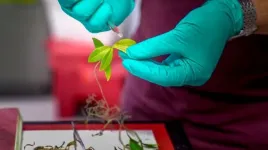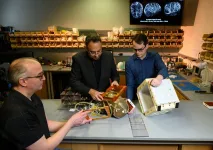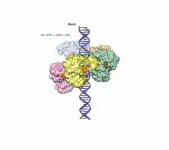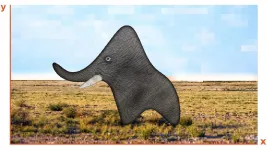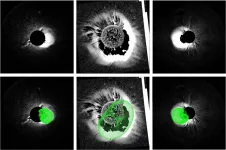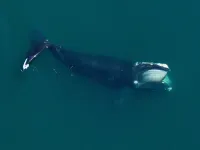(Press-News.org) Neurodegenerative disorders that cause dementia increase the risk of contracting severe COVID-19 and dying from the disease. For people with Alzheimer's the risk is three times greater. It can be six times greater if they are over 80, according to a study conducted in Brazil by researchers at the University of São Paulo (USP) and Butantan Institute in partnership with colleagues at the Federal University of Rio de Janeiro (UFRJ).
An article on the study, which was supported by FAPESP, is published in Alzheimer's & Dementia: The Journal of the Alzheimer's Association.
"We found that all causes of dementia are risk factors for severity and death in COVID-19 and that these risks are more pronounced for Alzheimer's patients," Sérgio Verjovski-Almeida, principal investigator for the project and a professor at USP's Chemistry Institute, told Agência FAPESP.
Dementia had already been identified as a risk factor for COVID-19, alongside other comorbidities, such as cardiovascular and respiratory diseases, high blood pressure, diabetes, obesity, and cancer. One of the reasons is age: patients with dementia tend to be older, and many live in care homes where the risks of infection and viral transmission are greater.
However, no studies had previously been conducted to find out whether people with neurodegenerative disorders that cause dementia, such as Alzheimer's and Parkinson's, are more infected by the novel coronavirus and run a greater risk of progressing to the severe form of COVID-19 or dying from the disease, and none so far had set out to see whether old age heightens this risk.
To answer these questions, the researchers investigated data on positive diagnoses, hospitalizations and deaths from COVID-19 for a cohort of 12,863 patients over 65, who tested positive or negative for SARS-CoV-2. The data was included between March and August 2020 in UK Biobank, a biomedical database containing genetic and health information collected from half a million patients since 2006 by a team led by Rory Collins, Professor of Medicine and Epidemiology at the University of Oxford.
Of the nearly 13,000 subjects, 1,167 tested positive for COVID-19 by RT-PCR. To control for a possible bias associated with younger asymptomatic individuals who were not tested, the researchers excluded subjects aged 49-65 and included only those aged 66 and older, stratifying them into three age groups: 66-74 (6,182), 75-79 (4,867), and 80-86 (1,814).
"The advantages of using clinical data from UK Biobank include the amount of detail, as the records refer to all pre-existing diseases and whether the patient tested positive, was hospitalized and died from COVID-19," Verjovski-Almeida explained. "This enabled us to assess the risk factors associated with infection, severity and death from the disease, including all causes of dementia, especially Alzheimer's and Parkinson's."
Statistical analysis showed that all causes of dementia, especially Alzheimer's, were risk factors for severity of the disease and death in the case of hospitalized patients, regardless of age.
Alzheimer's specifically did not increase the risk of hospitalization compared with chronic comorbidities. After admission to hospital, however, Alzheimer's patients ran a threefold risk of developing severe COVID-19 or dying from the disease compared with patients who did not have Alzheimer's. For Alzheimer's patients over 80 the risk was six times greater compared with patients in younger age groups.
"Some factor that hasn't yet been identified increases the predisposition of Alzheimer's patients to progress to severe COVID-19 and die from the viral disease," Verjovski said. "The results of our study point to a need for special attention to these patients when hospitalized."
Diagnostic hypotheses
A possible explanation for the observed outcomes is that chronic inflammatory conditions or defective immune responses due to aging of the immune system (immunosenescence) may increase the vulnerability of these patients and reduce their capacity to mount an effective response to infection by the virus.
Another hypothesis is that Alzheimer's alters the permeability of the blood-brain barrier, making infection of the central nervous system more likely.
Recent research has shown that SARS-CoV-2 is able to invade the central nervous system via the olfactory mucosa and that the presence of the virus in this region results in a local inflammatory immune response. The same study detected the virus in the brainstem, which comprises the primary cardiovascular and respiratory control center, raising the possibility that infection of the central nervous system may mediate or aggravate respiratory and cardiovascular problems in COVID-19 patients.
"We will now analyze these patients' genomes, also available from UK Biobank, to find out which genes are mutated and may be implicated in the augmented risk of severe COVID-19 and death for Alzheimer's patients," Verjovski-Almeida said.
INFORMATION:
About São Paulo Research Foundation (FAPESP)
The São Paulo Research Foundation (FAPESP) is a public institution with the mission of supporting scientific research in all fields of knowledge by awarding scholarships, fellowships and grants to investigators linked with higher education and research institutions in the State of São Paulo, Brazil. FAPESP is aware that the very best research can only be done by working with the best researchers internationally. Therefore, it has established partnerships with funding agencies, higher education, private companies, and research organizations in other countries known for the quality of their research and has been encouraging scientists funded by its grants to further develop their international collaboration. You can learn more about FAPESP at http://www.fapesp.br/en and visit FAPESP news agency at http://www.agencia.fapesp.br/en to keep updated with the latest scientific breakthroughs FAPESP helps achieve through its many programs, awards and research centers. You may also subscribe to FAPESP news agency at http://agencia.fapesp.br/subscribe.
ITHACA, N.Y. - Water regulation in leaves is vital to a plant's health, affecting its growth and yield, disease susceptibility and drought resistance.
A breakthrough technology developed by Cornell University researchers uses nanoscale sensors and fiber optics to measure water status just inside a leaf's surface, where water in plants is most actively managed.
The engineering feat provides a minimally invasive research tool that will greatly advance the understanding of basic plant biology, and opens the door for breeding more drought-resistant crops. The technology could eventually be adapted for use as an agronomic tool for measuring water status in crops in real time.
The study in maize plants, "A Minimally Disruptive Method for Measuring Water Potential In-Planta ...
Sickle Cell Disease (SCD) is a genetically inherited group of red blood cell disorders. END ...
DURHAM, N.C. - A group of researchers have discovered the detailed inner workings of the molecular motor that packages genetic material into double-stranded DNA viruses. The advance provides insight into a critical step in the reproduction cycle of viruses such as pox- herpes- and adeno-viruses. It could also give inspiration to researchers creating microscopic machines based on naturally occurring biomotors.
The research was conducted by scientists from Duke University, the University of Minnesota, the University of Massachusetts and the University of Texas Medical Branch (UTMB). The results appear online in a trilogy of papers published in Science Advances, ...
WHO: JoAnn Manson, MD, DrPH, Physician and Epidemiologist, Division of Preventive Medicine, Brigham and Women's Hospital; co-author of a new Perspective piece published in The New England Journal of Medicine (pdf attached)
WHAT: Less than 50 years ago, a U.S. Supreme Court decision paved the way for women's use of contraception irrespective of marital status, and a year later, in 1973, the Court ruled in Roe v. Wade that women have a right to legalized abortion. In recent decades, clinical researchers and policymakers alike have made important strides ...
You would not be surprised to see an elephant in the savanna or a plate in your kitchen. Based on your prior experiences and knowledge, you know that is where elephants and plates are often to be found. If you saw a mysterious object in your kitchen, how would you figure out what it was? You would rely on your expectations or prior knowledge. Should a computer approach the problem in the same way? The answer may surprise you. Cold Spring Harbor Laboratory Professor Partha Mitra described how he views problems like these in a "Perspective" in Nature Machine Intelligence. He hopes his insights will help researchers teach computers how to analyze complex systems more effectively.
Mitra thinks it helps to understand the nature of knowledge. Mathematically speaking, many data scientists ...
The surface of the sun churns with energy and frequently ejects masses of highly-magnetized plasma towards Earth. Sometimes these ejections are strong enough to crash through the magnetosphere -- the natural magnetic shield that protects the Earth -- damaging satellites or electrical grids. Such space weather events can be catastrophic.
Astronomers have studied the sun's activity for centuries with greater and greater understanding. Today, computers are central to the quest to understand the sun's behavior and its role in space weather events.
The ...
MADISON, Wis. -- For birds and other wildlife, winter is a time of resource scarcity. Extreme winter weather events such as a polar vortex can push some species to the edge of survival. Yet winter tends to get short shrift in climate change research, according to UW-Madison forest and wildlife ecology Professor Ben Zuckerberg.
"When we think about the impact of climate change, winter tends to be overlooked as a time of year that could have significant ecological and biological implications," says Zuckerberg. "It makes me, and my colleagues, think quite deeply about the impacts of these extreme events during this time when species are particularly vulnerable."
Zuckerberg, ...
Using a piece of magnet, researchers have designed a simple system that can control the movement of a small puddle of water, even when it's upside down. The new liquid manipulation strategy, described in the journal Cell Reports Physical Science on June 3, can have a wide range of applications including cleaning hard-to-reach environments or delivering small objects.
Previous attempts to control the movement of fluids often relied on special platforms. For example, on a surface that has one section more hydrophobic than another, water will spontaneously ...
Anyone that's ever interacted with a dog knows that they often have an amazing capacity to interact with people. Now researchers reporting in the journal Current Biology on June 3 have found that this ability is present in dogs from a very young age and doesn't require much, if any, prior experience or training. But, some of them start off better at it than others based on their genetics.
"We show that puppies will reciprocate human social gaze and successfully use information given by a human in a social context from a very young age and prior to extensive experience with humans," said Emily E. Bray of the University of Arizona, Tucson. "For example, even before puppies have left their littermates to live ...
Whales are largely protected from direct catch, but many populations' numbers still remain far below what they once were. A study published in the journal Current Biology on June 3 suggests that, in addition to smaller population sizes, those whales that survive are struggling. As evidence, they find that right whales living in the North Atlantic today are significantly shorter than those born 30 to 40 years ago.
"On average, a whale born today is expected to reach a total length about a meter shorter than a whale born in 1980," said Joshua Stewart of the National Oceanic and Atmospheric Administration (NOAA) in La Jolla, CA. That represents an average decline in length of about 7%. "But that's just the average--there are also some extreme cases where young whales are several ...
